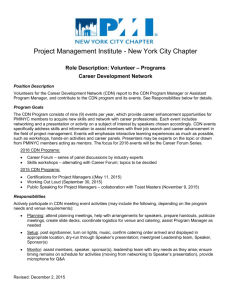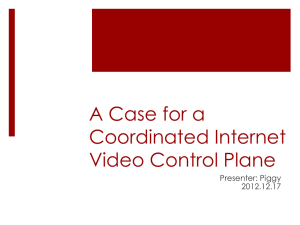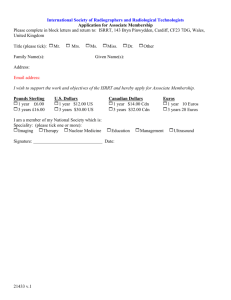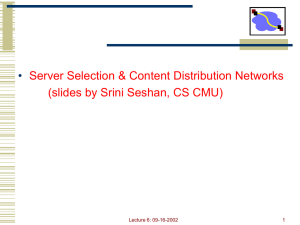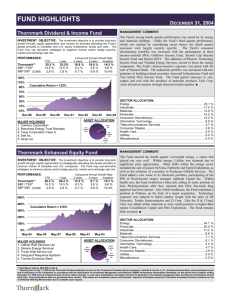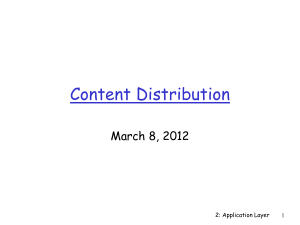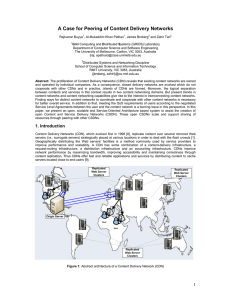Content Distribution Networks
advertisement
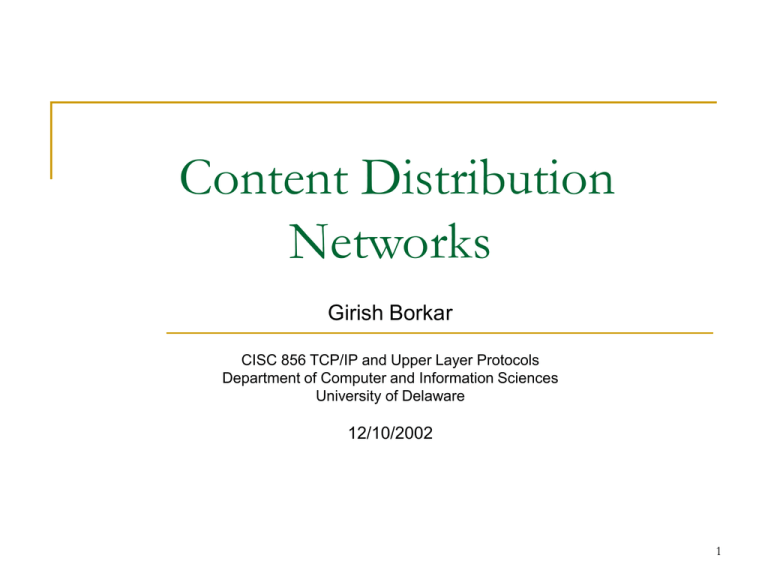
Content Distribution Networks Girish Borkar CISC 856 TCP/IP and Upper Layer Protocols Department of Computer and Information Sciences University of Delaware 12/10/2002 1 Outline Motivation What is content distribution ? Schemes for content distribution Web Caching Content Distribution Networks Peer-to-Peer File sharing (not covered) CDN Internetworking What content is/is not suitable for CDNs? CDNs vs. Caches 2 Slow Access Time Problem World Wide Wait Server Access Network Public Internet overloaded CNN network CNN.com congested link low bandwidth link ren.cis eecis Client Access Network 4 Server Farm Server-1 Server-2 Server-n Requests = R/n L4-L7 Switch Does load balancing Requests = R Internet 5 Client Network without a Web Cache Total delay = Internet delay + Access delay Δaccess link = 15x100 Kb/1.5 Mbps = 1 Avg. object size = 100 Kbits 15 requests/sec 100 Mbps LAN Internet delay=2 sec Access delay = HUGE 1.5 Mbps access link ΔLAN = 15x100 Kb/100 Mbps = 0.015 Δ – traffic intensity 6 Web Cache: Basic operation Web server GET Object present ? No-> Fetch Object Yes-> Send Object RESPONSE RESPONSE GET Cache RESPONSE GET Client 1 7 Web Cache Internet delay=2 Sec Total delay = (2 + .01) x 0.6 = 1.2 Sec delay = tens of milliseconds ΔAL = 0.6 Institutional cache Hit rate = 0.4 1.5 Mbps access link 100 Mbps LAN Δ – traffic intensity 8 Content Distribution Network of Caches Web server Web server Parent Child 1 Proactive replication Child 2 9 Problems with discussed approaches: Server farms and Caching proxies Server farms do nothing about problems due to network congestion, or to improve latency issues due to the network Caching proxies serve only their clients, not all users on the Internet Content providers (say, Web servers) cannot rely on existence and correct implementation of caching proxies Accounting issues with caching proxies. For instance, www.cnn.com needs to know the number of hits to the advertisements displayed on the webpage. 10 CDN: Basic Idea original content Replica congested Replica Not congested Client 11 Content Distribution Networks Mechanism for replicating content on multiple servers in the internet. providing clients with a means to determine the servers that can deliver the content fastest. 12 Terminology Content: Any publicly accessible combination of text, images, applets, frames, MP3, video, flash, virtual reality objects, etc. Content Provider: Any individual, organization, or company that has content that it wishes to make available to users. Origin Server: Content providers server , where the content is first uploaded. Surrogate Server: Content distributor’s server, where the replicated content is kept. 13 Players of the game Yahoo, MSNBC, Content Provider CNN Content Distributor Cisco, H/W and S/W Lucent, Vendor Inktomi, CacheFlow Akamai, Digital Island, AT&T Hosting Provider Exodus 14 CDN: Distribution Origin server in North America push content Akamai CDN CDN distribution node push content CDN server in South America push content push content CDN server in Asia CDN server in Europe 15 CDN: Functional Components Distribution Service Redirection Service Accounting and Billing system 16 CDN: Architecture Origin CDN Request Routing Infrastructure Surrogate Distribution and Accounting Infrastructure Surrogate Client 17 CDN: Request Routing Mechanisms Best surrogate selected based on some metrics. Techniques DNS based request routing Content Modification (URL rewriting) Anycast based Transport layer request routing Combination of multiple mechanisms 18 CDN: DNS based Request Routing www.cnn.com www.cnn.com Akamai DNS 63.251.132.22 surrogate Session 63.210.135.39 surrogate www.cnn.com 63.251.132.22 Local DNS Server 128.4.4.12 19 Content Modification Authoritative DNS server for cdn.com CNN.com <img src="http://www.cdn.com /cnn/images/1.gif”> ... GET www.cnn.com/index.html ... Index.html Index.html 64.236.24.28 DNS query: cdn.com ? Client 64.236.24.28 Local DNS server 20 Metrics Network Proximity (Surrogate to Client): Network hops (traceroute) RTT Internet mapping services (NetGeo, IDMaps) … Surrogate Load: Number of active TCP connections HTTP request arrival rate Other OS metrics … Bandwidth Availability 21 Full site delivery vs. Partial Site Delivery Full Site Delivery : All the contents are delivered by the CDN (including HTML, images, and other objects). Partial Site delivery: Only images, streaming media and other bandwidth intensive objects delivered by the CDN. 22 Content Distribution Internetworking: CDI Interconnection of Content Networks – collaboration between caching proxies and CDNs, as well as between individual CDNs Greater reach, larger scale, higher capacity, increased fault tolerance Basic architecture involves gateways between various content networks 23 CDI: Architecture Digital Island ATT Akamai comcast Cache network Content Peering Gateway 24 Content Suitable for CDNs Images High-volume e-commerce transactions (thanksgiving sale) Streaming media (audio and video) (media events) Java Applets Virtual Reality Objects Flash content Content NOT Suitable for CDNs Personalized content (my.yahoo.com,…) Dynamic Content Secure Content 25 CDN vs. Caching Proxies Caching Proxies CDN Used by ISP to reduce bandwidth consumption. Used by Content Providers to increase QoS. Operate Reactively Operate Proactively Caching proxies cater to their users (web clients) and not to content providers (web servers) CDNs cater to the content providers (web servers) and clients Caching proxies do not give control of the content to the content providers. CDNs do 26 Summary and References Caching CDN DNS based Request Routing CDI References: • Michael Rabinovich and Oliver Spatsheck, “Web Caching and Replication “, Addison-Wesley 2001. • PPT slides by Janardhan Iyengar on “Overlay Networks” • PPT slides by Brad Cain on “Interconnection of Content Delivery Networks” • http://www.cis.udel.edu/~girish/856/cdn-bib.pdf 27 Questions ? 28 Proxy deployments Non-transparent Explicit client configuration Browser auto configuration Proxy auto discovery Transparent Connection “Hijacking” or interception. 29 Transparent proxy deployment: Connection “Hijacking” Internet Other traffic TCP port 80 traffic ISP Proxy 30 Client IP = a1 Proxy IP = a2 Origin Server IP = a3 31
